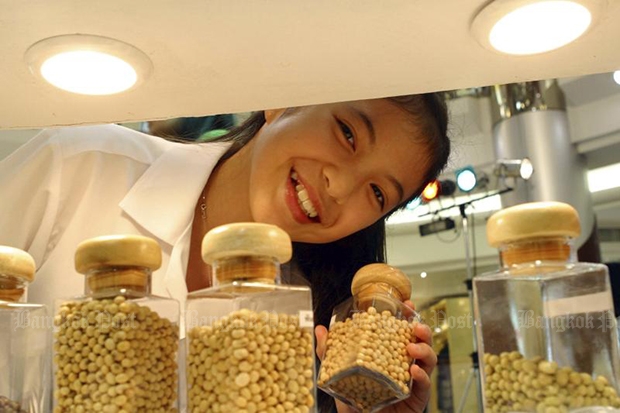
The government yesterday approved a three-year, tariff-free soybean import plan to ease domestic shortages on the condition that importers promote soybean farming and pay more for domestically grown soybeans.
Deputy Prime Minister Prajin Juntong, who chaired the vegetable oil committee meeting, said importers have to buy domestically grown soybeans at 15.50 baht per kilogramme plus two baht for the purpose of vegetable oil production, 15.75 baht per kg plus two baht for animal feed production and 17.75 baht per kg plus two baht for food production.
The higher prices are meant to entice Thai farmers to grow more soybeans, as Thailand produces just 60,000 tonnes a year, making up only 2% of total demand nearing 3 million tonnes. Thailand imports about 2 million tonnes annually for soybean meal.
The committee is expected to forward the proposal to the cabinet for approval, ACM Prajin said.
Jariya Suthichaiya, acting secretary-general of the Office of Agricultural Economics, said higher purchase prices will encourage rice farmers to grow soybeans after their rice harvests.
The government also pledged to promote farmers in the North and Northeast consolidating their farmland to grow soybeans using soft loans with special interest rates of as low as 0.01% offered by the state-run Bank for Agriculture and Agricultural Cooperatives.
Ms Jariya said domestic soybean production fell significantly the past several years because of hefty production costs induced largely by wage hikes. Farmers also cited lower profitability compared with crops such as corn and off-season rice.
The inaccessibility of better-yielding seeds also contributed to a lack of interest in growing soybeans.
She said soybean imports are expected to surge thanks to growing demand from livestock and aquaculture sectors, and rising demand for animal feed from neighbouring countries. Broiler farms, poultry layers and hog operations drive demand in livestock while shrimp farms are pacing soybean meal demand in aquaculture.
